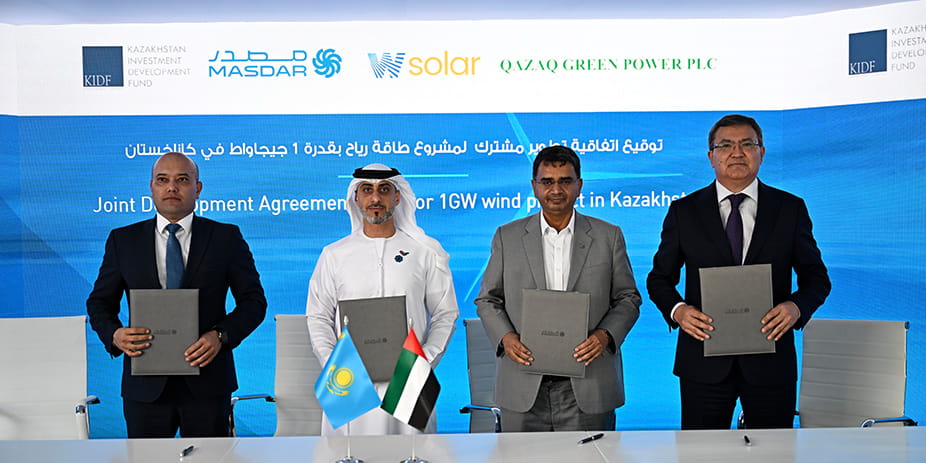Masdar Reaches Key Milestone in Kazakhstan Wind Farm Project
Hyphen Web Desk

Kazakhstan, which is among the world’s leading energy producers due to its vast oil and gas reserves, has set ambitious goals to reduce its carbon emissions. The government’s energy strategy includes a significant push toward diversifying the nation’s energy mix, with renewable energy projected to account for 50% of the total energy generation by 2050. The wind farm, which is one of the largest such projects in the country, will play a key role in helping Kazakhstan meet these climate goals.
The development is also a critical part of Masdar’s expanding portfolio of renewable energy projects. Known for its leadership in solar energy, Masdar has increasingly focused on wind energy to complement its solar power ventures. The company's growing wind energy portfolio spans multiple countries, including the United States, Egypt, and the United Kingdom, with a strong emphasis on large-scale, impactful projects. The 1GW wind farm in Kazakhstan will add to this list, cementing Masdar’s role in the global renewable energy landscape.
The Mangystau region, where the wind farm is situated, is known for its strong winds and favorable conditions for wind energy generation. This region's climate makes it an ideal location for large-scale wind farms. Once completed, the wind farm will contribute significantly to Kazakhstan’s national grid, supplying power to thousands of households and reducing the nation’s reliance on fossil fuels.
In addition to its environmental benefits, the project is expected to create hundreds of jobs in Kazakhstan, further boosting the local economy. The partnership between Masdar and the Kazakhstan government has also been hailed as a model for future international collaborations in the renewable energy sector. Through such collaborations, Masdar is not only expanding its footprint but also providing crucial technological expertise and contributing to the broader global energy transition.
Kazakhstan’s shift toward renewable energy sources is part of a wider trend across Central Asia. Countries in the region are increasingly looking to diversify their energy infrastructure to ensure long-term energy security and meet international climate commitments. The Masdar wind farm project serves as a major step forward in Kazakhstan’s efforts to reduce its carbon footprint while simultaneously increasing its energy independence.
Experts in the energy sector are optimistic that the completion of the wind farm will accelerate the development of other renewable projects in Kazakhstan. The success of this venture could serve as a catalyst for similar initiatives across the country, encouraging both public and private investments in green energy. The success of Masdar’s 1GW wind farm could also pave the way for other international companies to enter the market, further stimulating competition and innovation within the country’s growing renewable energy sector.
Beyond its role in Kazakhstan, Masdar’s wind farm is a key element in the company’s strategy to expand its global reach. The Middle East, despite being a hub for oil and gas production, has increasingly recognized the importance of diversifying its energy sources. Companies like Masdar are leading the charge in this transition, driving innovation in wind, solar, and other renewable technologies.
As the project progresses, the wind farm will not only help reduce greenhouse gas emissions but also contribute to the broader efforts to combat climate change. Wind energy, alongside solar, is seen as one of the most viable solutions to meeting the world's growing energy demands while reducing reliance on fossil fuels. The successful development of Masdar’s wind farm in Kazakhstan is a positive signal for the global renewable energy market, demonstrating that even nations traditionally reliant on fossil fuels are making strides toward sustainable energy futures.
The Masdar wind farm is also part of a broader effort by the company to become a global leader in clean energy. Through this and other large-scale projects, Masdar is helping to reshape the energy landscape, positioning itself at the forefront of the global transition to sustainable energy. As part of the UAE’s Vision 2021, Masdar is focused on becoming a key player in the global energy market, furthering its commitment to sustainability and innovation.
التسميات:
#Syndication
مشاركة:
